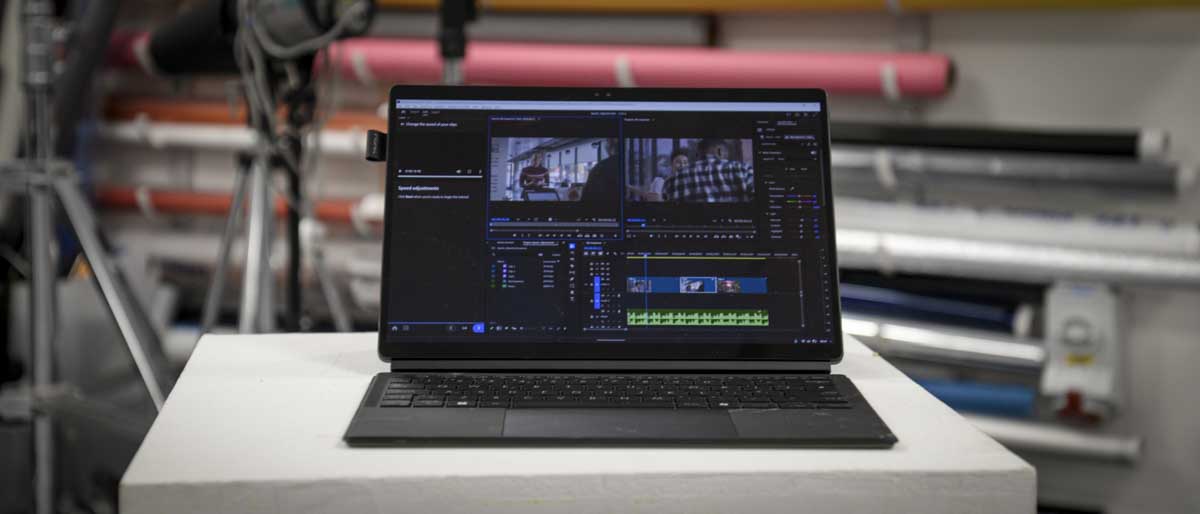TechRadar Verdict
The Asus ProArt PZ13 offers next-gen computing with a stunning OLED touchscreen display and superb performance. However, app compatibility might put off some users as not all applications, especially games, will run; however, for the most part, it excels.
Pros
- +
OLED display
- +
Sleek Lightweight design
- +
Stylus support
Cons
- -
Limited ports
- -
ARM-based processor
- -
Average speakers
Why you can trust TechRadar
Asus ProArt PZ13: 30-second review
CPU: Qualcomm Snapdragon X Plus
Graphics: Adreno X1
RAM: 16GB
Storage: 1TB SSD
Rear Ports: 2 x USB-C 4.0, microSD reader
Front Ports: None
Connectivity: Wi-Fi 6E, Bluetooth 5.3
Audio: Dual speakers, average quality
Camera: Rear 13MP, Front 5MP
Size: 297.5 x 202.9 x 9.4 mm, 0.85 kg
OS installed: Windows 11 Home Copilot+
Accessories: Keyboard cover, Asus Pen 2.0 stylus
The Asus ProArt PZ13 complements the two ProArt laptops from Asus and, of the three, is the one that raises the most interest. It's essentially a tablet and laptop in one and is not only packed with AI processing power but also features a DCI-P3 colour gamut 13.3-inch OLED screen that will instantly appeal to creatives.
However, while this machine runs on Windows 11 Home, it's powered by Qualcomm's Snapdragon X Plus, which is partnered with Adreno X1 graphics. That combination produces a performance that excels in many tasks, especially with Adobe and creative apps, which for the most part it handle absolute ease. However, with some apps, including our 3DMark and PCMark benchmarking software as well as many games, they refused to run.
Through testing, many aspects made this machine stand out, and it truly is a viable alternative to the Microsoft Surface Pro 11, offering excellent battery life and a lightweight but ultimately robust build. General performance across Adobe apps such as Photoshop and Premiere Pro was excellent, even without the full compatibility for Premiere Pro, with high-resolution images from the Sony A7 IV and Canon EOS R5 C being handled easily. The touchscreen and stylus, with all those points of sensitivity, made working directly on the images a fluid process. Likewise, editing 4K video, with a little storage capacity boost from a Samsung T5 EVO 8TB, was equally smooth, even if the edits for the particular piece were relatively simple.
It's worth noting, that Premiere Pro isn't 100% compatible as with several other apps, and as you start to install further apps and games, the limitations of the ARM processor become apparent. So, not yet the best video editing laptop option, even with the broad color space coverage - although during installation of Premiere Pro, for example, there is a note that Adobe is working on the ARM version of the software. Until then, the Intel version will be used. In reality, most jobs run smoothly enough, but as the processing power demands increase or more graphically demanding tasks are applied, the machine does, at present, start to struggle.
Likewise, when it came to gaming, things weren't so smooth, as quite a few of the games refused to load at all since they were designed for different processing architectures. So, while this tablet has power and puts in impressive performance, at present, there are some compatibility issues.
Asus ProArt PZ13: Price & availability
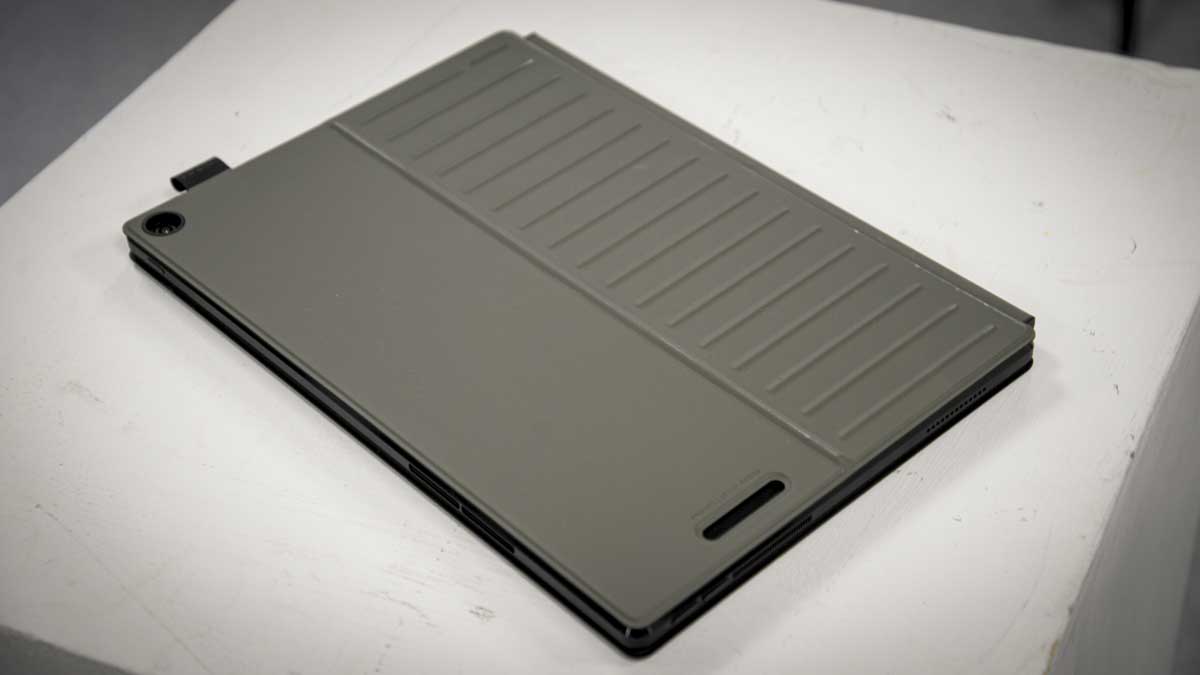
Priced at around $1,099.99, the Asus ProArt PZ13 is available through retailers such as Best Buy, Amazon, and the Asus website.
- Price: 4/5
Asus ProArt PZ13: Design & build
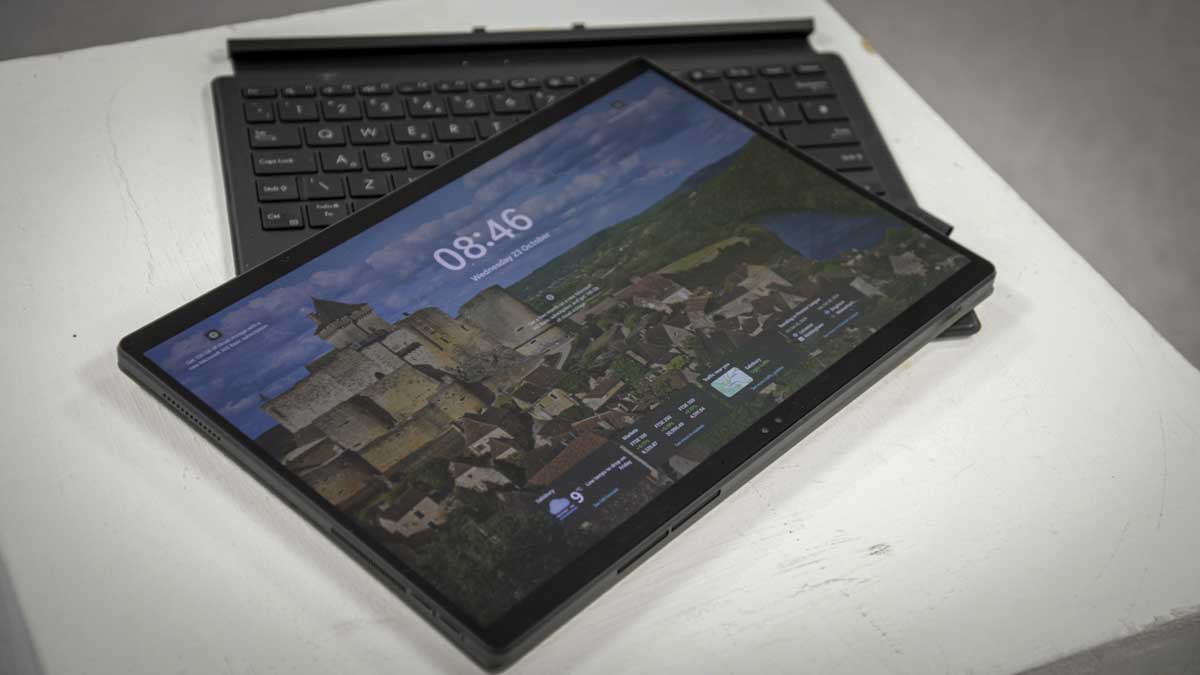
The ProArt PZ13 is designed as a two-in-one machine, so that you can use it as a creative tablet or laptop. As such, it comes with a removable keyboard, which is sleek and slim and doubles as a protective case and stand, although the link between the keyboard and monitor free moving so unlike a laptop won't support itself. This essentially means that on a table you can open it up like a laptop of the stand will support the monitor, however, on a lap that support is a little more tricky although not impossible.
Sign up to the TechRadar Pro newsletter to get all the top news, opinion, features and guidance your business needs to succeed!
One standout feature especially it you're working out in the field is that the PZ13 is IP52-rated, meaning it's dust-resistant and splash-proof, as well as being far more durable than your average tablet or laptop. This is something Asus has emphasised across its full line of ProArt laptops, and sure enough, in use, the ProArt has travelled through a variety of photo and video shoots, as well as delivering workshops and lectures, and not always in the most computer-friendly environments, where it proved to be an excellent, robust choice.
When it comes to size and weight, the PZ13 is slim and well weighted, measuring 29.75 x 20.29 x 0.90 cm and weighing just 850g. As you'd expect for a tablet, there's also a stylus, and if you want to remove the keyboard for a more slimline machine, it's quickly detached from the base. The case, of which the keyboard is part, further enhances the design with a green finish and a kickstand that enables you to prop up the screen when used as a laptop, although it's not ideal when supported on a lap.
A clever feature of the design is that the magnetic keyboard can be detached, rotated 180 degrees, and folded under the screen where it holds in place. This means that the keys are against the screen rather than facing down, offering a far more comfortable feel to the tablet compared with other devices.
The overall design and build is excellent, with a high-quality feel throughout the usage and design of the machine. Connecting to external devices is also quick and easy using one of the two USB4 ports, one of which can be used as the power in. There are also the usual array of wireless connection options including Bluetooth and Wi-Fi.
The 13.3-inch, 3K (2880 x 1800) OLED 16:10 aspect ratio screen is fully touch responsive and also features stylus support. The screen-to-body ratio is 87% so essentially covers most of the front of the tablet when used with the stylus which provides one of the most responsive and natural-feeling digital work surfaces available. What really stands out about the screen, aside from the 100% DCI-P3 colour gamut, is the surface itself. While glossy, reflections are well managed, and the viewing angle is superb, making it easy to adjust and enhance images directly on the screen.
When it comes to physical ports, again, the PZ13 is tailored to creative users, and while there are only a couple of options with two USB4 ports and an SD Express 7.0 slot if you're on the move then this should for the most part suffice. One of those USB4 ports is used for the power, although it can also be used for accessories and storage when not connected to power. These ports can be used to maximise transfer speeds to the machine and ensure that when dealing with high-resolution video stored on an external device, the speed of transfer is fast enough to keep up with the pace of the application—specifically, Premiere Pro in this test.
Overall, the Asus ProArt PZ13 is one of the sleekest tablet/laptops available. The size and connectivity options, touch screen and USB4 ports when coupled with the full version of Windows, make this an excellent choice in terms of design for creative users.
- Design: 4.5/5
Asus ProArt PZ13: Features
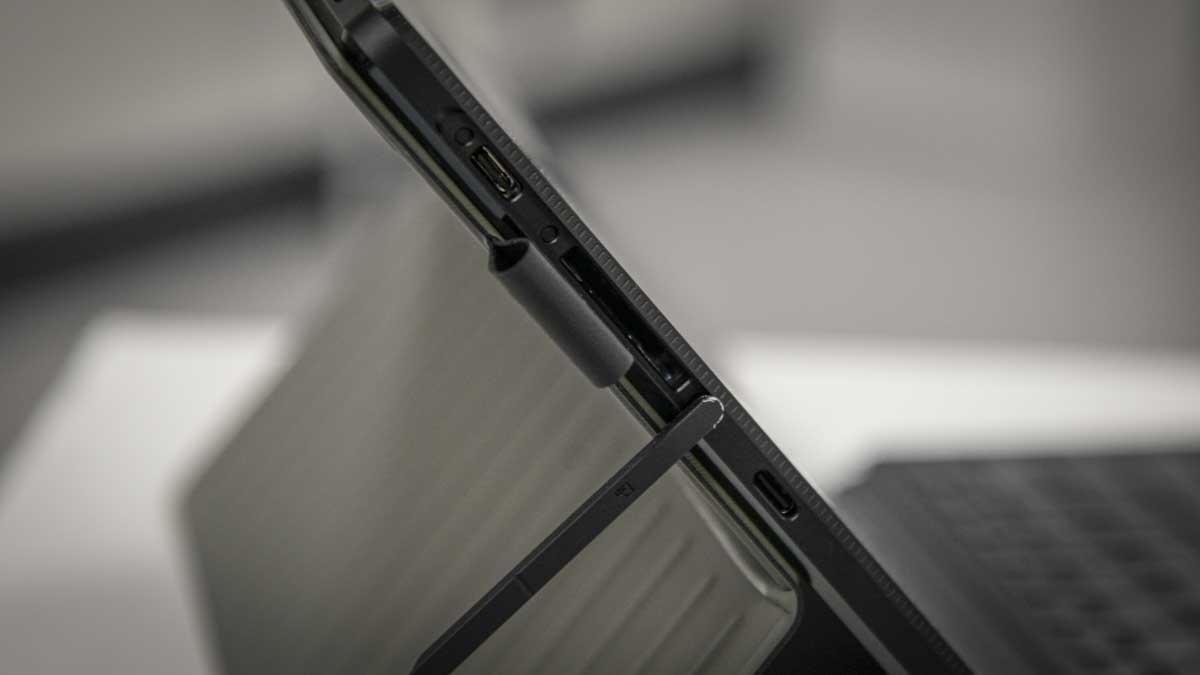
The big features of the ProArt PZ13, aside from the large 13.3-inch OLED touch display with a 2880 x 1800 resolution, include its two-in-one design and integration with AI toolsets and CoPilot.
As a tablet, the computing power delivered by the Snapdragon X Plus chip, while not as powerful as Intel or AMD alternatives, provides solid AI-enhanced performance, especially for creative apps that support this technology.
The ProArt PZ13 is equipped with the Snapdragon X Plus X1P 42 100 Processor (3.4GHz, 30MB Cache, up to 3.4GHz, 8 cores, 8 threads) alongside the Qualcomm Hexagon NPU, which offers up to 45 TOPS (trillion operations per second) and supports AI processing. Graphics are handled by a Qualcomm Adreno GPU, which is relatively untested with larger creative apps, but despite the lack of full support, especially for Premiere Pro the tablet still delivered an impressive performance during testing.
Due to its tablet design, the RAM and ROM are fixed, with 16GB LPDDR5X on board and a 1TB M.2 NVMe PCIe 4.0 SSD. However, as we did in this test you can utilise the USB4 ports to boost the storage at up to 40Gbps.
One of the standout software features enhanced by artificial intelligence is the Asus suite of AI-powered workflow apps, and these are accessible through the ProArt Creator Hub. This suite includes applications such as the AI-powered StoryCube, which utilises the machine's AI capabilities to help organise media files.
Alongside the apps, the Creator Hub enables you to manage system resources. If an application requires more allocated processing power than others, the Hub lets you assign resources as needed. It also provides an overview of hardware performance, such as heat levels and usage, and allows you to switch between modes depending on whether you need longer battery life or full power.
For creative users the Hub also gives you quick control over various display settings, including colour gamut adjustments. This feature enables you to quickly switching between modes such as standard, vivid colours, sRGB for web content, DCI-P3 for cinematic tones, and Display P3 for photography.
When you combine these display modes with Asus 2.0 stylus support, you get a highly natural way of interacting with the screen and pen strokes, making the PZ13 ideal for both photographic and art-based work.
As for power, the PZ13 comes with a 65W power supply but is also compatible with most PD power banks and stations. During testing, it was paired with a Bluetti AC60 and charged in the field via USB Type-C. Internally, it houses a 70WHrs, 3S1P, 3-cell Li-ion battery, which offers a surprising amount of battery life, considering the tasks the tablet was used for.
- Features: 4/5
Asus ProArt PZ13: Performance
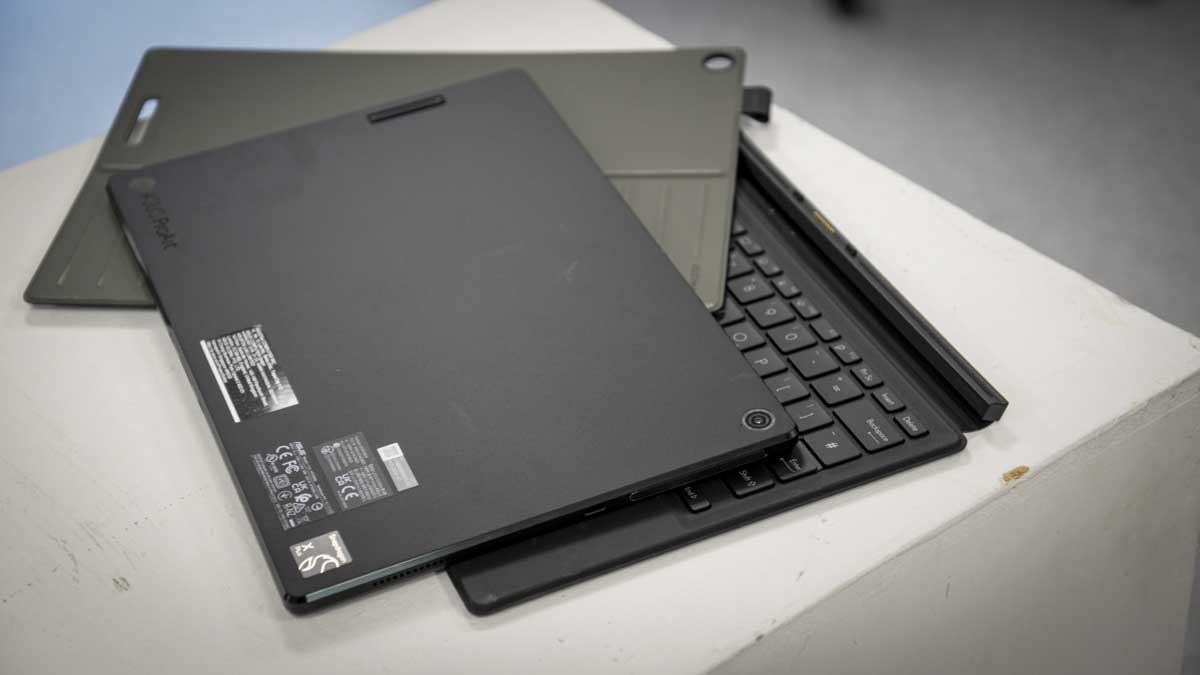
Crystal Disk Read: 5130.53MB/s
Crystal Disk Write: 4883.76MB/s
GeekBench CPU Single: 10746
GeekBench CPU Multi: 2294
GeekBench Compute: 10073
PC Mark: n/a
CineBench CPU Multi: 5494
CineBench CPU Single: 1065
Fire Strike Overall: 906
Fire Strike Graphics: 860
Fire Strike Physics: 13589
Fire Strike Combined: 455
Time Spy Overall: n/a
Time Spy Graphics: n/a
Time Spy CPU: n/a
Wild Life: 11377
Windows Experience: n/a
The ProArt PZ13 is by no means the first two-in-one tablet in this price range, but considering the competition, it packs a surprising amount of processing power for the price.
From the outset, it's worth noting that there are some compatibility issues with certain applications. For instance, Adobe Premiere Pro on installation shows a message indicating that it hasn't been programmed for use with the ARM processor. However, the Intel version of the application can still be used.
In practice, through the test Premiere Pro worked without issue, handling files from the Sony A7 IV, and delivering an impressive performance, capable of editing and grading FHD and 4K video footage with relative ease.
That said, some games present challenges. For example, Hogwarts Legacy refused to load beyond a certain point just going to a black screen, and many other games experienced similar issues, although some did play without issue. So, if you're considering this device for gaming, it might be best to wait until full support arrives for the CPU and GPU, those games that do play, play smoothly. However, for video streaming and playback, the speed of the machine is clearly evident.
In regular use, the PZ13 performs exceptionally well. For tasks like Google Docs and web browsing, the laptop ran for a full working day—well over 10 hours with some breaks—without needing a charge. With more power-intensive applications such as Photoshop and Premiere Pro, the battery life dropped more swiftly. However, it still managed a solid 4-6 hours, again factoring in breaks during working sessions.
While the PZ13 generally feels like using any other high-powered PC laptop or tablet, you may occasionally notice that some applications, particularly games, won't load. Overall, the performance of this two-in-one is exceptional with the high quality screen, along with the robust yet stylish design making it a great option if you're looking for an on-the-go solution.
- Performance: 4/5
Should you buy the Asus ProArt PZ13?
The Asus ProArt PZ13 2-in-1 design is an ideal option for creative professionals, but it does have its limitations. The incredible touch screen and its pressure point sensitivity, along with tablet-to-laptop flexibility and AI-powered features, make it perfect for artists, photographers, videographers, and content creators who need a lightweight computer. However, its ARM-based Snapdragon X Plus processor does create compatibility issues with certain applications, especially those that demand high processing power or still need to be optimised for ARM architecture.
All things considered, this is a great machine that balances battery life, features, and power. As long as gaming isn't high on your priorities and creative applications such as the Adobe suite are, then this is a perfect choice.
| Row 0 - Cell 0 | Row 0 - Cell 1 | Row 0 - Cell 2 |
Value | Great value for creatives needing portability and colour-accurate display | 4 |
Design | Sleek, lightweight design with versatile 2-in-1 functionality for fieldwork. | 4.5 |
Features | Strong feature set with OLED screen, stylus support, but limited ports. | 4 |
Performance | Impressive for creative tasks but limited by ARM processor for apps. | 4 |
Total | Excellent device for creatives, but some software limitations to consider. | 4 |
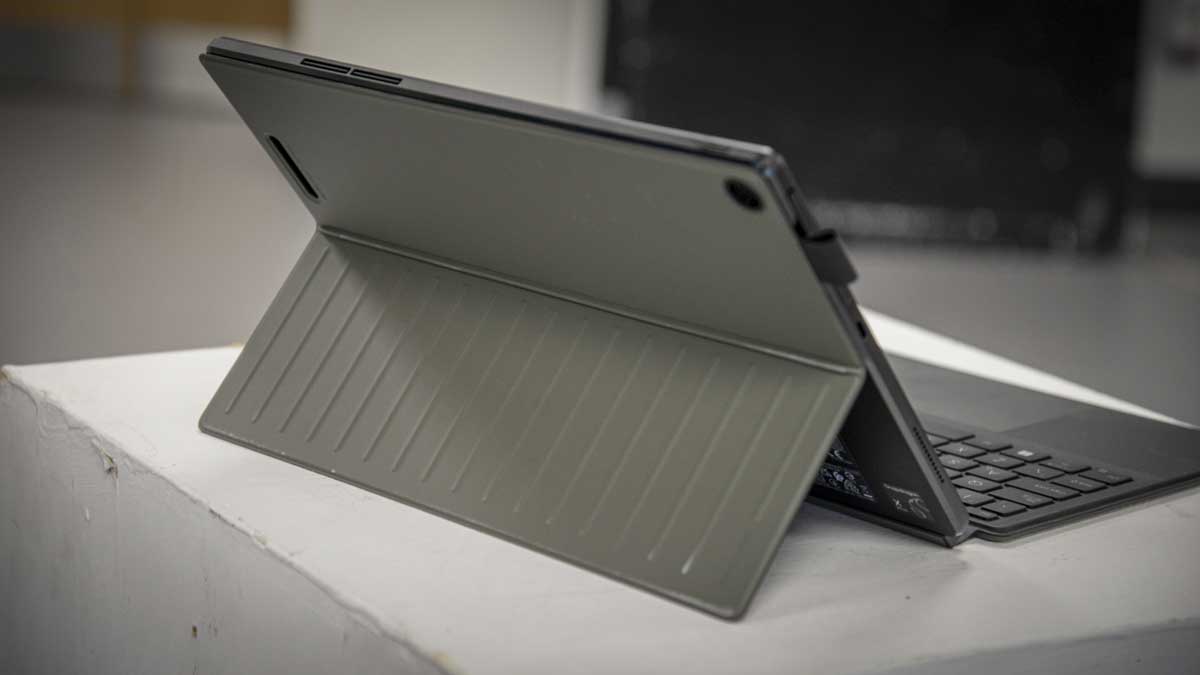
Buy it if...
Portability is a priority
If you need a lightweight, versatile device with a long battery life for creative work on the move, the ProArt PZ13 excels. It's perfect for those who travel frequently or require a compact yet powerful setup for fieldwork.
It would help if you had a colour-accurate display
The OLED display with 100% DCI-P3 support makes it an excellent choice for photographers, videographers, and graphic designers. Its vibrant and accurate colour reproduction is ideal for creatives working with visual content.
Don't buy it if...
It would help if you had extensive port options
With only two USB-C ports and a microSD slot, connectivity may be limited without the use of external hubs or dongles. If you rely heavily on multiple peripherals or wired connections, this could be a drawback.
You rely on heavy-duty apps
The ARM-based Snapdragon X Plus chip might struggle with more demanding software that isn't optimised for ARM architecture. If your workflow involves power-hungry apps or games, this limitation may affect performance.
We've tested the best photo editing PCs - and these are our top picks
Alastair is a photographer, filmmaker and tech writer who has been working in the publishing industry since the late 1990s. For more than 25 years he has covered photography, video and technology across Future's photography, technology and gaming brands. He runs a photography and video production company and lectures in TV and film. He can usually be found testing mini PCs or prototyping and prop building with the aid of 3D printing.
